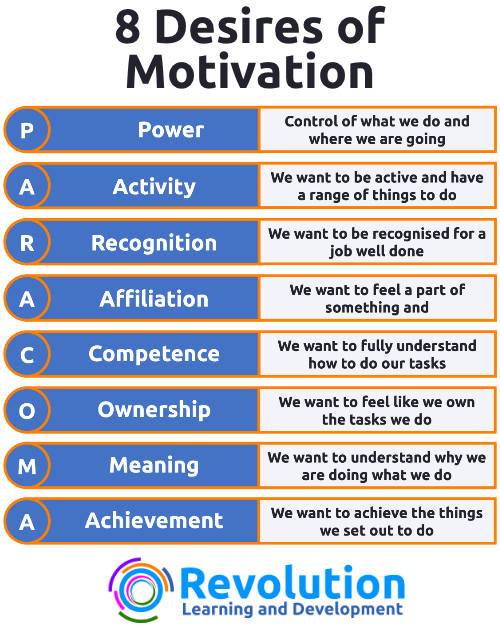[toc]
There are many motivational theories out there, but one of my favourites I’ve come across in the past has to be Motivation Using Dean Spitzers 8 Desires of Motivation.
Dean Spitzer’s 8 Desires of Motivation
In his book ‘Supermotivation’, Spitzer describes 8 desires which cause inner motivation. These inner motivators are closely linked to Hertzberg’s Internal Motivators. We use these in our Motivation Skills training course to provide help and guidance on how to motivate yourself and others.

Spitzer’s 8 Desires or Motivation are:
The desire for Power – People want to be in control of where they are going. In organisations with top-down structures, this can be difficult. People want their power to control where they are going. You can do this by allowing people to set their own objectives, providing they are in line with the organisation’s vision.
The desire for Activity – People want to be involved and active. In our lives, we try to avoid boredom and monotony, yet at work, we tend to accept jobs that are like this without complaint. However, internally we know that we don’t want to be doing these. As leaders, we could involve people in decisions that affect them and in team decisions to provide that power of choice.
The desire for Recognition – People want to be recognised for a job well done and feel appreciated by others. A simple thanks or some feedback on a job or task carried out can go a very long way. This is a great way of energising people to want to do more.
The desire for Affiliation – People want to feel part of something, whether it be the local team or the wider organisation. Doing things to create a team environment will energise those who are social and will create a stronger team bond. Help people to see where they fit into the organisation.
The desire for Competence – People welcome opportunities to become more competent. Training and developing people to be better at their jobs can provide the energy these people need.
The desire for Ownership – People want to feel as though they own tasks or jobs that they do. Physiological ownership can be even more powerful than physical ownership. Delegate ownership of tasks and don’t just use GOFER delegation. Agree on objectives and ensure you discuss what THEY are going to do.
The desire for Meaning – People want to understand what they are there to do. If they have to press a button all day at work, ensure they know why and what the consequences of not pressing the button are. People want to know what difference they are making.
The desire for Achievement – People want to achieve what they set out to do, whether it’s to climb a mountain or a work based objective. Help people to understand how realistic their goals are, envisage what problems they may encounter and what they will do to overcome them.
Using the 8 Desires to Motivate
What can you do to understand what individuals motivators are? The simple answer is to ask them. Share the above motivators with them and question them on which of these motivators relate to them.
Remember the pneumonic PARACOMA.
Motivational Skills Training Course
Want to know more about Spitzer’s 8 Desires of Motivation and how to use them to motivate yourself and others? Take a look at our Motivational Skills Training Course for more.




